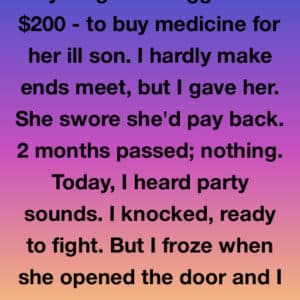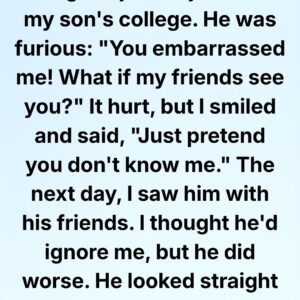I thought my golden years would be spent in a warm living room, surrounded by family, not on a narrow cot in a homeless shelter. But grief has a way of stripping life down to its truth, peeling back the polite lies and exposing secrets you never imagined were there.
Advertisement
My name is Helen, and I’m 72 years old. If you’d told me ten years ago that I’d be lining up for soup and sleeping with my suitcase as a pillow, I would’ve laughed, poured you a cup of coffee from my own kitchen, and told you not to be so dramatic. Back then, I had a home, a husband, and a future that felt settled. Now I know better. Life doesn’t always crash down with a roar. Sometimes it quietly takes what you love, one piece at a time, and waits to see if you’ll learn to stand again.
A happy woman pouring coffee | Source: Pexels
My life used to be full. I had my son, Mark, who was the center of my world. And I had George, my husband, who built our house with his own hands. Every creaky stair, every dent in the banister, every faded patch of paint told a story. We raised Mark there, watched him grow from a boy with scraped knees into a man with calloused hands and kind eyes. That house held birthday candles and casseroles after funerals, Sunday cornbread and quiet evenings where the loudest thing in the room was the ticking clock.
Advertisement
Then George got sick. Cancer. The slow kind that steals a person little by little. I held his hand through every appointment, every sleepless night when pain wouldn’t let him rest. And when he finally slipped away, the silence he left behind was heavier than any noise.
A couple holding hands | Source: Pexels
After he was gone, the house turned into a museum of echoes. His chair by the window no one sat in. His mug on the counter that I couldn’t bring myself to move. His low murmur reading the morning paper that my mind kept trying to conjure from thin air. The winters grew colder, my knees weaker, and the staircase steeper with every passing year.
Advertisement
By then, Mark had moved to the city with his wife, Laura, and their two children. One night, he called and said, “Mom, you shouldn’t be alone. Come live with us. There’s plenty of room. The kids will love it. Laura and I will feel better knowing you’re safe.”
I almost said no. Laura and I had always been… polite. Not hostile, but not close either. Still, I told myself things would be different with the grandchildren running around. I’d have a purpose again. And the truth was, my health didn’t leave me with many options.
A sad woman looking at a photo | Source: Pexels
Selling the house was like ripping out a piece of my chest. I cried the day I handed over the keys. That place wasn’t just wood and brick. It was forty years of being George’s wife, of being Mark’s mother, of knowing where I belonged. But I told myself the money would do something good. It would help us renovate, make their house big enough for all of us. We’d build a new version of “home” together.
Advertisement
Almost all of the money from the sale went into their place. The guest room needed work. The kitchen was cramped. The roof leaked, and the backyard looked like nature was trying to reclaim it.
An overgrown backyard garden | Source: Pexels
Mark and I stood in the hardware store, choosing paint colors like we were picking out pieces of our future. He grinned and said, “We’re making this house a home for all of us now.” I believed him—because I needed to.
Advertisement
For the first two years, it wasn’t bad at all. I helped with the kids, folded laundry, kept dinner ready. I never expected a medal or flowery speeches, but Laura didn’t even offer a simple “thank you.” Instead, she looked at me like I was some piece of secondhand furniture—useful, but always in the way.
A rocking chair on a porch | Source: Pexels
Mark stayed kind, always. He worked long hours, but he’d sit with me at the kitchen table after the kids were in bed, nursing a cup of tea and rubbing the back of his neck.
“I don’t know what I’d do without you, Mom,” he’d say, and for a moment, I’d feel rooted again.
Advertisement
The kids adored me. “Grandma Helen!” they’d shout as they barreled into my arms. We had dance parties in the living room, built lopsided blanket forts, and baked cookies that were shaped more like blobs than circles. Their laughter made the house feel alive.
A happy grandmother with her grandkids | Source: Pexels
But little by little, Laura’s tone sharpened.
“Helen, could you not leave dishes in the sink?”
“Helen, the kids are too hyper after you give them sweets.”
“Helen, don’t fold Mark’s shirts like that; they wrinkle.”
At first, I told myself she was stressed. Her job at the law firm kept her stretched thin, and she was always on the move. I thought maybe she was jealous that the children flocked to me. I forgave it because that’s what mothers and grandmothers do—we absorb it and keep going.
Advertisement
One evening, she came home early and found us dancing in the kitchen to an old Motown record. The kids were using wooden spoons as microphones, shrieking with laughter as I spun them around.
She stood in the doorway, arms crossed, face like stone. “You’re going to spoil them,” she said flatly. “Life isn’t all fun and games.”
After that, she made a point of coming home earlier. She’d step into bedtime stories, correct the children in front of me, and say things like, “They depend on you too much. It’s not healthy.”
An unhappy woman | Source: Pexels
Advertisement
Mark stayed mostly silent, stuck in a place where every word felt like a choice between his wife and his mother. I never wanted him to have to choose, so I smiled, swallowed the hurt, and kept going.
Then everything shattered.
It was a Thursday in the fall. The house smelled like fresh banana bread cooling on the counter. The phone rang, and I answered, expecting a school or appointment call.
“Mrs. Harris?” a man said gently. “This is Officer Grant. I’m afraid there’s been an accident.”
Everything went hollow. Mark had been hit on the highway. They said it was quick. That he didn’t suffer.
A car that was involved in an accident | Source: Pexels
Advertisement
I don’t know if I screamed. I remember Laura collapsing. The kids asking when Daddy would be home. I remember doors opening and closing, people bringing casseroles, and the world moving as if someone had hit mute on my own life.
A sad woman sitting on a bed | Source: Pexels
The funeral was a blur of black clothing, murmured condolences, and faces I couldn’t fully register. Everyone said the same things: “He was such a good man.” “He loved you all so much.” They were right. That’s what made losing him unbearable.
Advertisement
Not long after, Laura changed again. The raw grief hardened into something colder. She stopped looking at me, stopped speaking to me unless she had to. Her attention turned to paperwork, mortgages, insurance, logistics—everything but the people left standing in the wreckage.
One night, I heard her speaking on the phone in the hallway, her voice low but sharp.
“I can’t do this with her still here,” she said. “It’s like she’s a reminder of everything I lost.”
The words felt like a slap. I was a reminder, not a person.
A depressed woman sitting on her bed | Source: Pexels
Advertisement
I stayed for the children. They needed stability. Or maybe I needed to believe they did. A week later, Laura asked me to sit with her after dinner. Her plate was untouched.
“Helen,” she said quietly, “I think it’s time.”
My stomach tightened. “Time for what?”
“Time for a change. You’ve done a lot, but I think it’s best—for all of us—if you moved out.”
A determined woman | Source: Pexels
Advertisement
“I… this is my home too,” I whispered. “I gave you everything from the sale of my house.”
Her expression didn’t flicker. “That was your choice. You didn’t have to. But you can’t stay here anymore. The house is too crowded. I want to live alone with the kids.”
I felt my heart physically ache. She stood up, conversation over, and walked away while I sat there staring at my hands.
I cried all night. The kind of crying that leaves you empty and aching.
A sad woman crying in bed | Source: Pexels
Advertisement
The next morning, I came downstairs and saw my suitcases by the door. She’d packed my life while I was sleeping.
“I called a cab,” she said. “It’ll be here in ten minutes.”
“Laura,” I whispered, “I have nowhere to go.”
“You living here was always Mark’s idea,” she said coolly. “I’m not going to keep putting up with it.”
She didn’t hug me. She didn’t even tell the kids. I told them I was going to visit an old friend for a while. It was a lie, but I couldn’t stand the thought of them watching me get pushed out.
A sad child | Source: Pexels
Advertisement
In the taxi, the driver asked, “Where to, ma’am?”
For the first time in my life, I didn’t have an answer. After a long silence, I said, quietly, “Take me to the nearest senior shelter.”
The shelter was clean but unmistakably a place for people with nowhere else to go. Disinfectant and old linoleum, rows of cots, and eyes that had seen too much. They gave me a bed in the corner and a shared locker. A bowl of lukewarm soup. I didn’t complain. I didn’t have the energy.
A partial view of a woman lying in a bed | Source: Pexels
Advertisement
I kept my suitcase beside me like a guardrail and tucked a small photo of Mark and the kids under my pillow. That first night, I stared at the ceiling while the sounds of coughing and restless sleep echoed around me. I wasn’t scared. I was just… hollow.
Days turned into a routine. Breakfast at seven. Volunteers handing out medicine. Chores if you wanted to help. Lights out at nine. I volunteered for everything I could. Folding sheets. Sweeping floors. Organizing the pantry.
A woman folding a sheet | Source: Pexels
It made me feel like I still existed.
Advertisement
One morning, I helped another resident find a matching pair of shoes in the donation bin. She squeezed my hand and said, “You’re an angel.”
I smiled, but inside I felt like a ghost—someone whose life had already happened.
Then, on a rainy afternoon, everything shifted.
I was sitting by the window in the common room, sewing a button onto a little sweater someone had dropped off, when the front door opened. I heard the scrape of a chair, the murmur of a question at the reception desk.
A chair | Source: Pexels
“Is there a Helen Harris here?” a man’s voice asked.
Advertisement
The attendant pointed in my direction. I looked up.
A man in a suit stood there with a leather briefcase and rain speckled on his shoulders. He looked familiar in that way where your memory has to reach back and dust off old images.
“Mrs. Harris?” he said, walking toward me. “You may not remember me. I’m David Collins. I worked with your son, Mark, at the firm years ago.”
A man in a suit | Source: Pexels
I squinted, then the memory clicked into place. “David… you used to come over for dinner. You always brought wine Laura pretended to like and lost every chess game to Mark.”
He laughed softly. “Guilty.”
I set the sweater aside, suddenly alert. “What are you doing here, David?”
Advertisement
“I’ve been looking for you,” he said, sitting down. “I went to the house first. Laura told me you weren’t living there anymore. No one seemed to know where you’d gone. I asked around until someone mentioned you’d once talked about volunteering at shelters. I started calling…” He gestured around. “And here we are.”
A man on a call | Source: Pexels
My heart stuttered. “But… why? It’s been years.”
He opened his briefcase and took out a thick folder and a sealed envelope. “Because of this,” he said gently. “Your son left something for you. It was part of his private estate. He asked me to deliver it personally.”
My breath caught. “Mark left something… for me?”
A woman looking up | Source: Unsplash
Advertisement
David nodded. “He set up a trust in your name. He didn’t want you to ever worry about money or security. He told me, ‘No matter what happens, I want my mom taken care of.’”
My hands trembled as I unfolded the papers he handed me. The numbers blurred through my tears. It was more money than I’d ever seen with my name attached. Enough to live comfortably. Enough to have a home again.
A man looking at some papers | Source: Pexels
“He thought of me,” I whispered. “Even after…” My voice broke. “He still protected me.”
David’s eyes softened. “He loved you very much, Mrs. Harris. He didn’t want you to be dependent on anyone—not even Laura.”
A man smiling | Source: Pexels
Advertisement
“Did he know?” I asked quietly. “What she might do?”
“He hoped he was wrong,” David said gently. “But he prepared for the possibility.”
I took a long, shaking breath. For the first time in years, I felt air fully fill my lungs.
“What do I do now?” I asked.
“You let me help,” he replied. “We’ll find you a place of your own. Somewhere safe. Somewhere that belongs to you.”
A bright and colorful field | Source: Pexels
Advertisement
Within weeks, everything changed. David helped me with the paperwork, the bank visits, the search. I moved into a small cottage on the edge of town. White shutters. A little front porch. A patch of garden that looked like it had been waiting for someone to love it.
The first night I slept there, I cried—not from sadness, but from relief. The walls were quiet, but they were mine.
I planted roses in the backyard and hydrangeas by the fence. I started baking again, filling the kitchen with the smell of cinnamon and butter. I read by the window with a cup of tea. A stray cat started visiting, then simply decided he lived there. I named him Benny.
A cat yawning | Source: Pexels
Advertisement
David visited often—sometimes with groceries, sometimes just to sit and talk. He listened the way Mark used to. No rush. No judgment. Just presence. In time, our conversations began to feel less like obligation and more like friendship.
Nearly three years later, on a gray rainy afternoon, someone knocked at my door.
I opened it and felt my heart lurch.
It was Laura.
She looked smaller, thinner, the sharp edges worn down. Her eyes were tired, and whatever armor she used to wear had cracks in it now. Her umbrella dripped on the step.
An umbrella in the rain | Source: Unsplash
“Hi, Helen,” she said softly. “May I come in?”
Advertisement
I hesitated, then stepped aside. “Of course.”
She stepped into the living room, looking around at the framed photos, the tidy furniture, the flowers on the table. Her gaze landed on a picture of Mark with the kids, smiling at the ocean.
“I didn’t know about the money,” she said suddenly, voice trembling. “Not until a year after you left. I found the documents in a box in the attic. I swear, Helen, I didn’t know he’d done that for you.”
A teary-eyed woman | Source: Pexels
I studied her. “Even if you didn’t know,” I said quietly, “you still sent me away.”
She nodded, tears forming. “I was broken. Angry. I blamed you because you were there, and he wasn’t. I thought if you left, the pain would go with you. It didn’t. The kids are grown now. They hardly visit. I lost my job when the firm went under. I lost everything. And I think… it’s what I deserved.”
Advertisement
I looked down at my hands, then back at her. “I never hated you, Laura. I was hurt. You were always looking forward—to the next case, the next goal. You never really looked at what was right beside you.”
A serious woman looking at someone | Source: Pexels
She let out a broken breath. “Mark used to say you were the heart of our home. I didn’t understand that then. Now I do. I’m so sorry, Helen. For all of it.”
We sat in silence for a moment, the sound of rain tapping the roof like an old lullaby. I rose, poured her a cup of tea, and handed it to her. We drank quietly, two women who’d loved the same man in different ways and both lost him.
Advertisement
Eventually, she stood and set the empty cup down. “You deserved better,” she said, voice raw. “Thank you for letting me say that.”
I walked her to the door. “Goodbye, Laura.”
A woman looking back | Source: Pexels
She turned once on the porch, her eyes meeting mine, then walked down the path into the rain. I watched her go, not with triumph, but with a strange, gentle peace.
Advertisement
Because in the end, my son gave me something she never could: a way to stand on my own, to build a life that wasn’t dependent on anyone’s permission.
I’ll spend the rest of my days in this little cottage he secured for me—not with bricks and mortar, but with foresight and love. Every rose bush, every creak in these new floorboards, every quiet morning with Benny at my feet is a reminder.
I was not discarded. I was redirected.
And even now, when the light hits the window just right, I can almost hear Mark’s voice saying, “You’re okay now, Mom. You’re home.”





